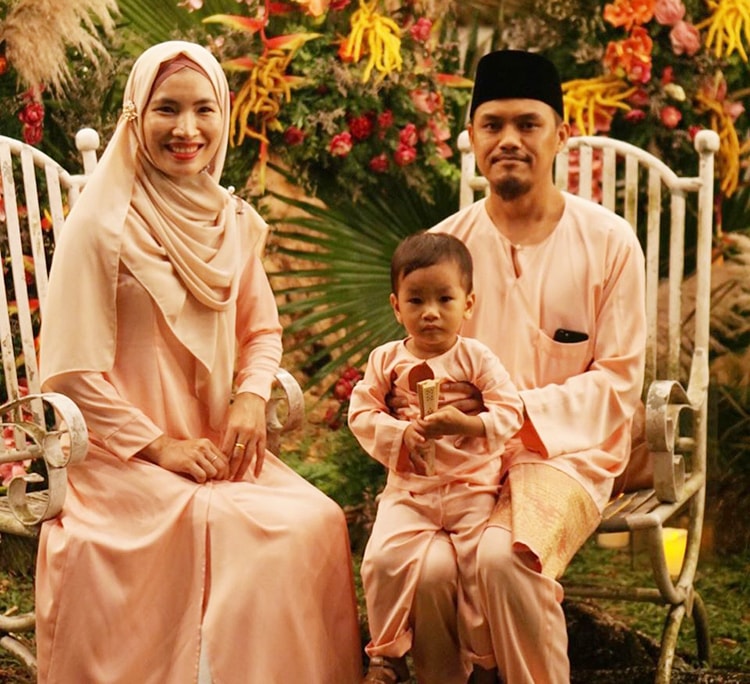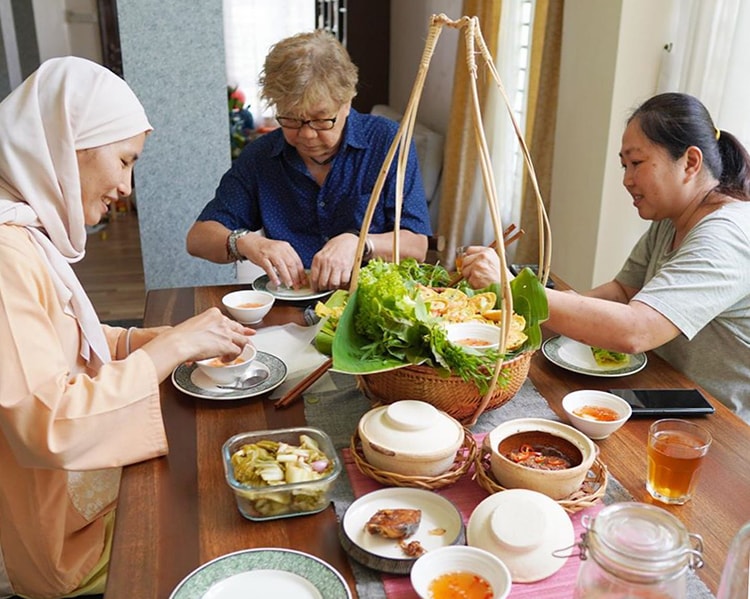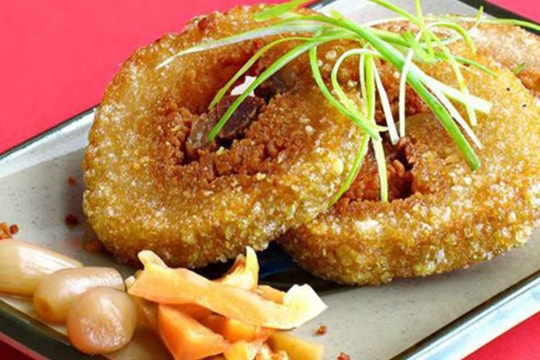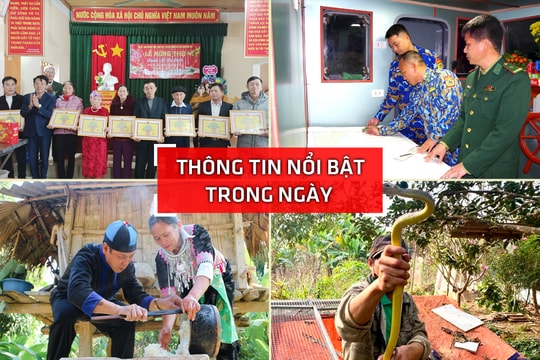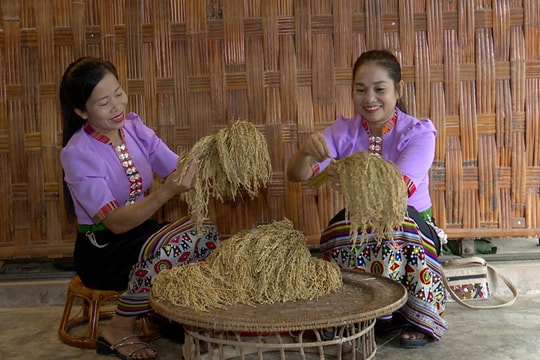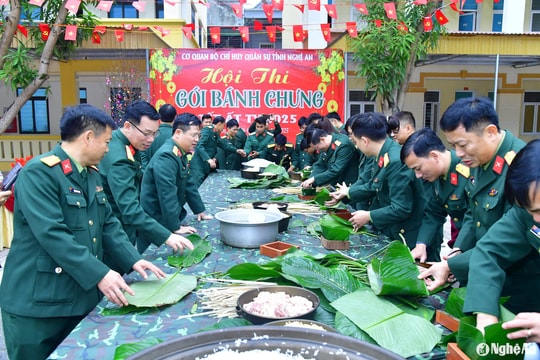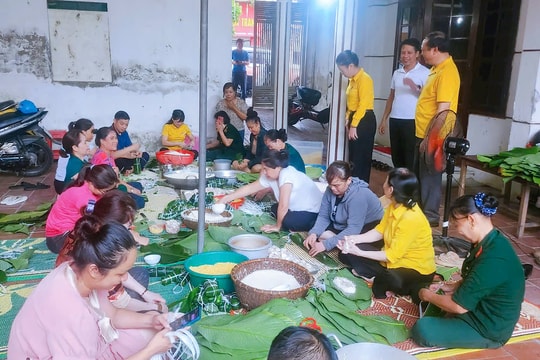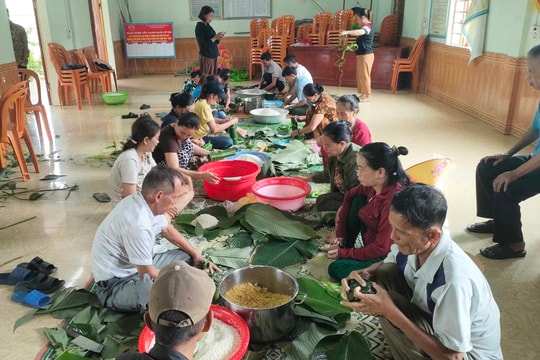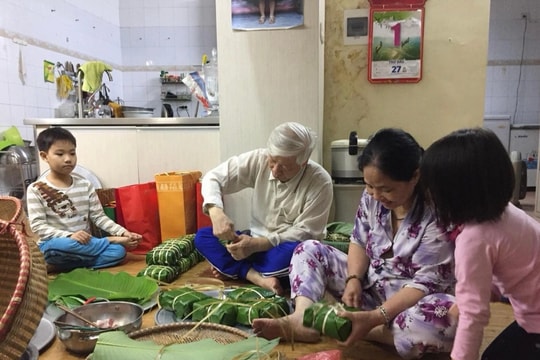Malaysian son-in-law wraps banh chung to win over his wife's family in Vietnam
The first time he came to Ngoc Mai's house during Tet, Saif Al din was busy washing dong leaves in a corner, not daring to eat anything and not saying a word.
Although married in Malaysia and converted to Islam, Ms. Nguyen Thi Ngoc Mai still returns to Vietnam to celebrate Tet every year. She is proud that despite being a foreigner and following a different religion, her husband, Mr. Saif Al din, always loves Vietnam and respects the country's cultural traditions.
|
Mr. Saif Al din, Ms. Ngoc Mai and son. Photo:Character provided |
Saif and Mai met during a trip to Cambodia in 2010. The Vietnamese girl, who was alone in a strange place, felt "fluttered" after the Malaysian guy she had just met accompanied her throughout the trip and took good care of her. Falling in love with Mai, Saif quickly flew to Hanoi to meet his girlfriend's family, determined to express his true feelings.
It was the days before Tet 2011, Ms. Mai still had not had time off from work, while the whole family was busy wrapping banh chung. Just landed in Hanoi in the cold of 8-9 degrees Celsius, he took a taxi straight to his girlfriend's house with an empty stomach and was assigned by her to wash dong leaves. Ms. Mai's family has many children and grandchildren, so every year wrapping banh chung takes up to 5 days, of which washing the thousands of dong leaves alone takes a whole day.
"I don't know Vietnamese, Mai's parents don't know English, and they don't approve of our relationship, so I didn't dare say a word. I just focused on washing dong leaves to wrap banh chung," Saif said.
Ms. Mai still clearly remembers the scene when she came home that afternoon and saw her boyfriend sitting alone, not having eaten anything, his face was sad, "both funny and pitiful". She said that the two previous times Saif came to Vietnam, her parents refused to meet him because they did not want their daughter to marry a foreigner.
For the next year and a half, Saif and Mai had to find a way to "go around", win the favor of their aunts, uncles, nieces and nephews, and then ask everyone to influence their parents. In 2012, they officially received the nod from both families to become husband and wife.
"Just thinking about washing thousands of dong leaves in the yard, in the cold, makes my hands cold. My husband is used to living in hot countries, but now he is washing leaves in the cold and conquering his mother-in-law. It's really a bitter plan," Mai joked.
For the past 7 years, except when Mai was pregnant with their first son, every Tet, Saif and his wife returned to Vietnam, rolled up their sleeves to wash the leaves, and helped the family wrap banh chung. He also proactively reminded his wife to visit relatives, give lucky money to the children, and take spring photos for everyone.
After getting married, he also took the initiative to learn Vietnamese so that he could communicate with his wife's family. Mai spoke Vietnamese to her husband as a common everyday language, even though he did not fully understand it, to help him get used to it and remember it.
"Now I have a basic understanding of Vietnamese. When I go home, I can ask my wife's parents about things. When I go to the market, I know how to ask for prices and bargain. I'm no longer afraid of getting lost when I go out," said Saif.
After marrying a Vietnamese woman, he also fell in love with Vietnamese food. When asked what his favorite dish was, he immediately mentioned Bun Dau Mam Tom. Mai, who has loved cooking since she was a child, always takes the opportunity to go into the kitchen to show off her cooking skills to her husband and children while promoting Vietnamese cuisine.
|
Ms. Mai and students in a Vietnamese cooking class in Kuala Lumpur. Photo:Character provided |
Ms. Mai is the owner of an online store in Kuala Lumpur that specializes in serving Vietnamese dishes for Muslims, a religion that makes up 60% of Malaysia's population.
"Vietnamese cuisine is very rich, but foreigners mostly only know about pho and spring rolls. That's really a pity," she said. "There aren't many Vietnamese restaurants in Kuala Lumpur, and most of them are difficult for Muslims to eat. Therefore, my service focuses on Vietnamese dishes prepared with ingredients suitable for Muslims."
Each meal will include 7-8 dishes, each dish in small quantities, so that diners have a comprehensive view of Vietnamese cuisine. Avoiding pork, all dishes are prepared by Ms. Mai from beef, chicken or seafood, with strong seasoning and aroma similar to Malaysian taste. Ms. Mai believes that every Vietnamese person abroad is a cultural ambassador, so she does not simply sell food, but also spends time chatting with customers to introduce each dish, its origin, ingredients, and meaning. Her dishes such as Hue beef noodle soup, banh xeo, beef in fish sauce... all won the hearts of Malaysian and Chinese diners at the first time.
To make Vietnamese food more popular in Malaysia, she also opened weekly cooking classes for those who love Vietnamese food. Over the past 5 years, many Malaysian women have come to this cooking class, made Vietnamese dishes themselves and returned home to cook for their families.
"I want more women to be able to cook delicious and healthy Vietnamese dishes for their husbands and children. That is also a way to keep Vietnamese cuisine alive in every family kitchen," she said.
This year's Tet, Ms. Mai's customers have the opportunity to enjoy a meal with "4 bowls and 8 plates" as the Tet standard of Hanoi people, including a bowl of meatballs, a bowl of bamboo shoots, a bowl of chicken vermicelli, a bowl of rice and plates of sticky rice, banh chung, fried spring rolls, beef in fish sauce, squid rolls, ham... As for banh chung for Muslims, the filling is not pork as traditional but beef.
"The list of Vietnamese foods I like is long. I also like the dishes my wife cooks every day," Saif proudly said about his wife. "Vietnamese women are very capable and good at managing the family."
|
Saif Al din and the banh chung he wrapped himself. Photo:Character provided |
This year, Mai and her husband went home for Tet holiday for more than a week.She feels luckier than many women who marry into foreign countries because her parents-in-law treat her like their own children, and her husband shares with her and returns to Vietnam every year to celebrate Tet. When she first arrived in Malaysia, it took her 6 months to get used to the spicy and strong-smelling local food and to wear ao dai and a headscarf in the heat of over 30 degrees Celsius. But now this place has become as familiar as a part of her.
After 7 years, Saif also has a second home to return to every spring, which is Vietnam. "I love Tet very much. It is an occasion for the family to reunite and meet each other after a year apart. Everyone puts aside their busyness and worries to leisurely think about the good things ahead," said the Malaysian man.
Yesterday morning, Saif not only washed dong leaves but also wrapped and cooked banh chung (sticky rice cake) with beef filling. His nearly 3-year-old son played happily around his father, chattering in Vietnamese, Malay and English.

